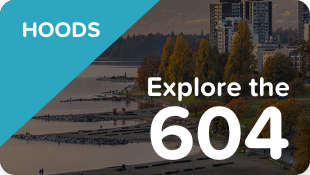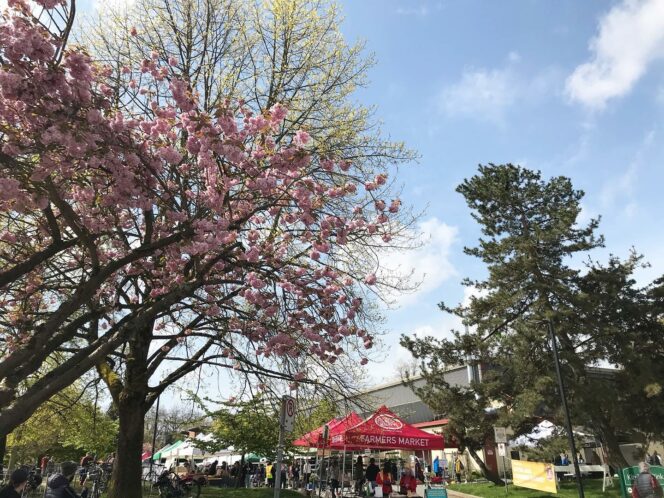
Photo: Vancouver Farmers Markets (Kitsilano Market)
Vancouver Farmers Markets have just launched their spring season, with various markets open all across the city. These vibrant local food hubs have a long and proud history in this city that began nearly three decades ago.
Vancouver Farmers Markets (VFM), a not-for-profit society, was founded in 1995 when some East Vancouver neighbours met in the basement of the Britannia Community Centre. They noted food insecurity in their area and very little in the way of local produce being sold nearby. “They thought a farmers’ market would be able to address this lack of food access in their community. And it snowballed from there,” says Laura Smit, Executive Director of Vancouver Farmers Markets.
Their first season was held at the Croatian Cultural Centre, with many craft vendors as well as eight farm vendors. For the initial market, the farmers sold out within an hour. “They hadn’t known what to expect, and the people of Vancouver were ready to receive them,” Smit says.
Since then, VFM has grown considerably, offering markets year-round. Currently, there are three running (Riley Park-Summer, Trout Lake, and Kitsilano), each open a specific day of the week, but more will be starting up again (West End – May 21, Mount Pleasant – May 22, Downtown – June 1, False Creek – July 14) as the spring and summer unfold.
Smit says that part of the evolution of VFM has been expanding the markets beyond their East Vancouver origins. “Rather than having this idea of having one place where you can buy local food and connect with producers, we’re keenly interested in finding ways of connecting with more Vancouver neighbourhoods,” Smit explains.
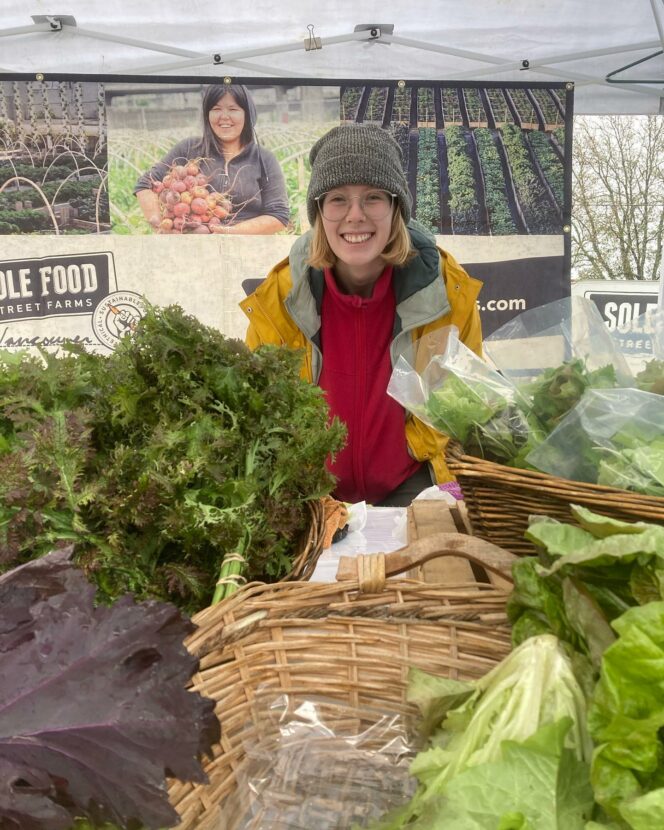
Photo: Vancouver Farmers Markets (Sole Food Farms)
She explains that easy accessibility to local food is a key concern, especially since 80% of visitors are more likely to walk to a farmers’ market versus traveling far to visit one by car, transit, or bike. In addition to geographic accessibility, VFM has long been involved in initiatives to combat economic inequity when it comes to food access. Currently, the BC Association of Farmers’ Markets administers a BC Farmers’ Market Nutrition Coupon Program, which is supported by the Province of BC and community donors. Each year, roughly 500 lower-income families, seniors, refugees, and expectant parents in Vancouver visit the markets and use the coupons to buy fresh food.
VFM has expanded the provincial Coupon Program by fundraising for a Fresh to Families Fund, which provides coupons as well as food skills and nutritional programming. “We love the program because through the money we fundraise, families are able to use coupons to spend on fresh food and make dignified choices about the food they want to eat,” Smit says. She recounts how one family was so excited that they were able to find a particular variety of eggplant at the market that they weren’t able to find at supermarkets around town. And the coupons help local farmers by increasing their sales.
In 1995, when VFM began, it was technically illegal to sell produce out of a truck, and prepared food such as cookies were considered high risk items. The types of offerings at the markets have changed and broadened over the years even as VFM continues to be a farmer-first organization that prioritizes small local producers. VFM also operates product-direct markets, meaning visitors are dealing directly with the people who harvested or made what they are purchasing.
Since its inception, VFM has been working closely with health authorities, like Vancouver Coastal Health, to expand the kinds of products (e.g., salmon) considered to be safe in an open-air market environment. “They’re a place where you get to see what can be grown around the area. But we’re not just about farms; we’re also about folks who are making and preparing food,” Smit says. Products sold include jams, pickles, Jamaican patties, and Asian dumplings. As well, with Vancouver’s plant-based ethos, there are a wide variety of vendors selling vegetarian and vegan products, including cashew cheeses and plant-based perogies. “You can come to the market and get treated to a smorgasbord of tastes and flavours that can really support a sustainable, local, and delicious lifestyle,” Smit says.
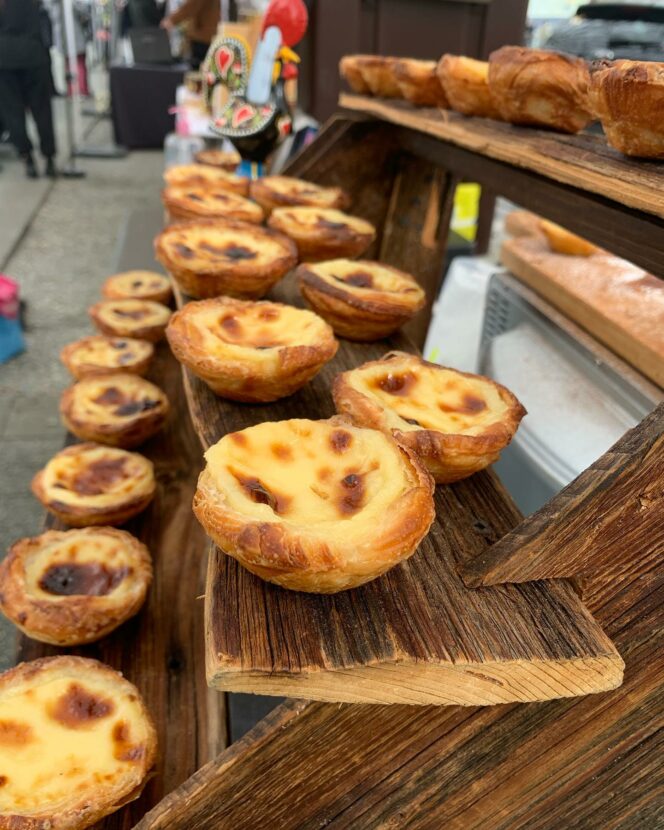
Photo: Vancouver Farmers Markets (Casa de Nata)
Some of the vendors have been selling at the markets since they started. Farms and farming collectives that have long been involved with VFM include Forstbauer Family Natural Food Farm, Langley Organic Growers, and Organic Farm Connection. In some cases, it’s the next generation who are now running the farm and coming to the markets. In January, during the slower winter season, VFM runs a Seed for Growth program to provide support for new business owners to test out their products. This year, they featured start-up vendors, such as the Empanada Girls, Sauce Club, and Tamaly Shop, who will be appearing at various markets during the warmer months.
Smith explains that vendors are chosen for a balance of fresh and prepared foods, and to provide enough variety so that people can do a full grocery shop at the market—or browse for a unique item that they wouldn’t be able to find at a grocery store. It’s a place to be social and get to know local producers: “If you’ve got the time, part of the market experience is getting to talk to somebody who is making their product and seeing if you can get a taste—and you might just get hooked,” Smit says.
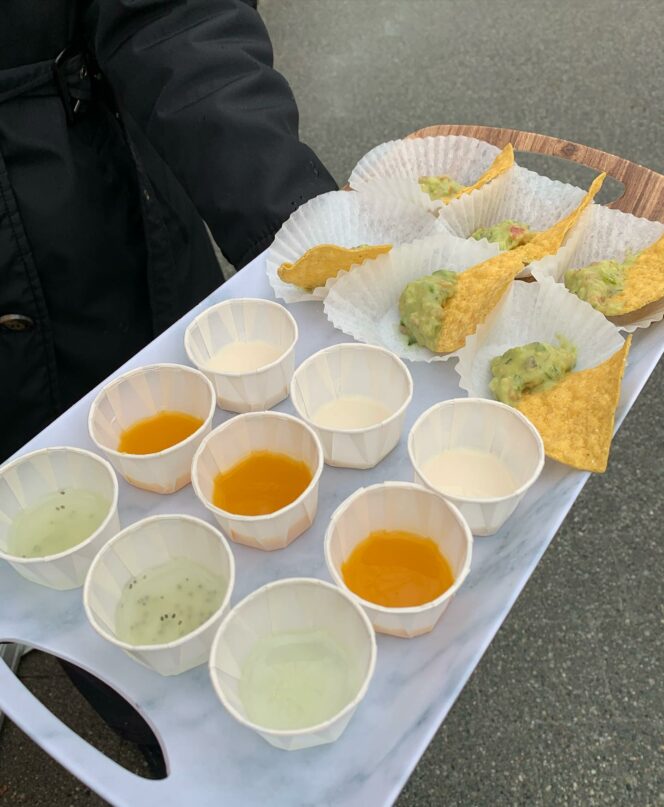
While samples weren’t available during the early days of the pandemic, the markets still operated and actually took on increased importance. VFM saw a 50% reduction in visits but their sales remained stable. VFM worked with the health authorities and municipality to ensure safety while continuing to provide essential access to local food. And ironically, many people came to the markets for a sense of community, even in a distanced away. “To stand in line, six feet away from your friend or your neighbour was one of the casual ways you could still have social interaction,” Smit says. Because of capacity limits at the time, line-ups were long but everyone was so patient and grateful to have the chance to support local farmers.
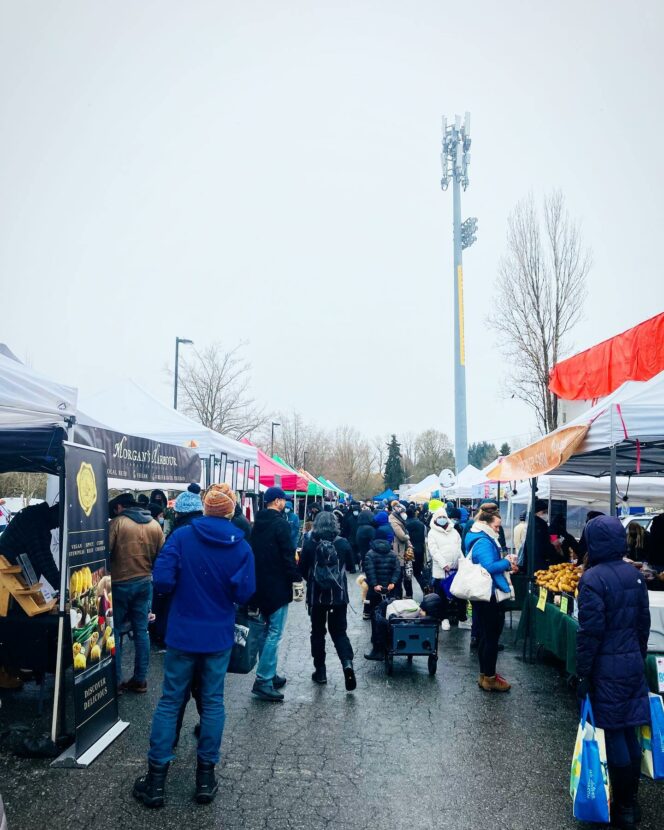
Photo: Vancouver Farmers Markets
Ultimately, this loyalty to VFM attests to Vancouver’s vibrant food culture. “Vancouver has a love of the local and a love of food. And I think it, increasingly, is coming to understand and celebrate the diversity of the people and cultures who make Vancouver home. So, farmers’ markets are a reflection of the really good food that can be grown and produced in this region,” Smit says. In May, fresh offerings become more varied, including items like asparagus, in addition to greenhouse produce such as tomatoes, cucumbers, and peppers. Vendors who engage in wild harvesting are also worth a visit, with foraged products like morels and wild nettles. In summer, people visit to find prized heirloom tomatoes, in addition to produce like corn, zucchini, nectarines, and plums.
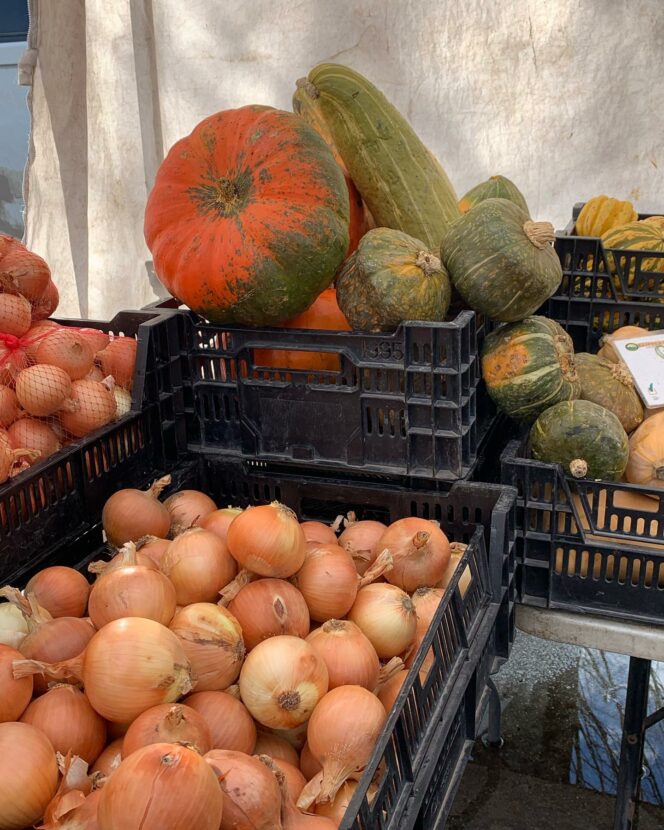
Photo: Vancouver Farmers Markets
For those new to VFM or on a tight budget, Smit recommends treating a visit to one of the markets as a fun, inexpensive activity for trying out samples and perhaps finding something special to purchase as a treat. “Go to the market as an experience, and enjoy your time there,” she says, adding, “When you do taste market produce, you realize it’s really excellent value. It’s usually ecologically grown or certified organic. There are varieties you can’t find anywhere else, and the produce is fresher. It generally lasts longer, and it tastes better than produce you’re going to find at a big-box store.”
Overall, Smit is optimistic about the spring and summer at the markets. “We’re really excited to go into this summer season. We’re hopeful about this return to markets as a festive place to come and spend time. And we’re excited to welcome people back who may have been staying away during the pandemic, and to see all the friendly and familiar faces again,” she says.










